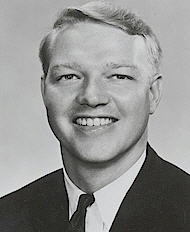 Mark Crispin passed away on the 28th of December. While I didn’t know him well, Mark was a very important visionary in the area of Internet applications, and Email and character sets in particular.
Mark Crispin passed away on the 28th of December. While I didn’t know him well, Mark was a very important visionary in the area of Internet applications, and Email and character sets in particular.
I first enjoyed his work as a user of the MM program on TOPS-20, upon which he based the design of IMAP. MM featured strong searching and marking capabilities, as well as all the customization a person could want. It was through MM that people individualized their messages with funny headers or a cute name. And it was all so easy to use. Mark was constantly reminding us about that, and how UNIX’s interface could always stand improvement. Mark was an unabashed TOPS-20 fan.
Before the world had fully converged on vt100 semantics, Mark worked to standardize SUPDUP and the SUPDUP option. He was also early to recognize the limitations of a single host table. Mark’s sense of humor brought us RFC-748, the Telnet randomly-lose option, which was the first April 1 RFC. He also wrote another such RFC for UTF-9 and UTF-10.
Most of us benefit from Mark’s work today through our use of IMAP, which followed Einstein’s advice by having a protocol that was as simple as possible to tackle the necessary problems, but no simpler. We know this because our first attempt was POP, which was too simple. Mark knew he had hit the balance right because he made benefited from his experience with lots of running code and direct work with many end users.
I will miss his quirkiness, his cowboy boots, and his recommendations for the best Japanese food in a town where the IETF would visit, and I will miss the contributions he should have had more time to make.
 When I grew up in New Jersey in the ’70s and into the ’80s, one of the constants in my life was my father’s love of the Philadelphia Phillies. Throughout the Spring and Summer, we would turn the rotor Antenna toward Philly and bring in snowy Channel 17, WPHL, to watch the game and listen to Harry Kalas and Richie Ashburn. When we were on the road we would listen to them as well, as one would provide coverage on the TV and the other on the Radio.
When I grew up in New Jersey in the ’70s and into the ’80s, one of the constants in my life was my father’s love of the Philadelphia Phillies. Throughout the Spring and Summer, we would turn the rotor Antenna toward Philly and bring in snowy Channel 17, WPHL, to watch the game and listen to Harry Kalas and Richie Ashburn. When we were on the road we would listen to them as well, as one would provide coverage on the TV and the other on the Radio.